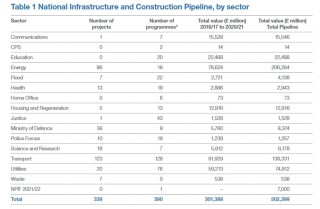The new National Infrastructure & Construction Pipeline is 60% funded by the private sector and 40% by the state. It includes major projects ranging from the Thames Tideway Tunnel to the A14 upgrade.
The net increase in the value of the pipeline since spring 2016 is more than £37bn. This includes £10.5bn of extra economic infrastructure and housing investment over the next four years announced at autumn statement 2016.
According to the Infrastructure & Projects Authority (IPA), the Treasury department behind the document, the latest version of the pipeline is the “most comprehensive ever”. It lists more than £500bn of planned investment, with £300bn of this to be invested by March 2021.
This includes:
- a new £2.6bn package for transport networks, enabled by the new National Productivity Investment Fund (NPIF), including £1.3bn for roads and local transport networks and £390m for low emission and driverless vehicles
- a £5.3bn housing investment package, including a £2.3bn Housing Infrastructure Fund funded by the NPIF to fund infrastructure to support the delivery of up to 100,000 homes, and an additional £1.4bn funded by the NPIF investment in affordable housing to deliver 40,000 new affordable homes
- more than £1bn that the government will invest in digital infrastructure by 2020-21.
The three sectors with the highest level of investment to 2020/21 are transport (£92bn), energy (£79bn) – of which nearly half is made up of electricity generation – and utility networks (£59bn). Together, these three sectors make up more than three quarters of the total value of the £300bn pipeline to 2020/21.

Of the £92bn transport investment, more than £20bn is going on roads and nearly £15bn on high speed rail.
IPA chief executive Tony Meggs said: “Creating the IPA has enabled us to produce a more comprehensive pipeline. Having the visibility and certainty of a pipeline of construction and infrastructure investment allows industry to invest strategically for the market, not just tactically for the project. We will continue this comprehensive approach, working with industry to deliver the pipeline.”
Civil Engineering Contractors Association (CECA) chief executive Alasdair Reisner added: “If the UK infrastructure sector is to plan for the investment in skills and innovation that will be required to deliver world-class infrastructure in the coming years, it is vital that companies are able to strategically allocate funding on a basis of projected need. The pipeline is a crucial tool that enables companies to plan ahead and deliver optimal outcomes for clients, taxpayers, and communities.”
The document can be read in full on the IPA website www.gov.uk/government/publications/national-infrastructure-and-construction-pipeline-2016
Got a story? Email news@theconstructionindex.co.uk



